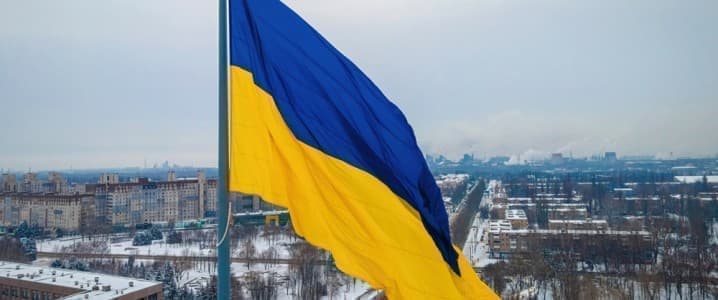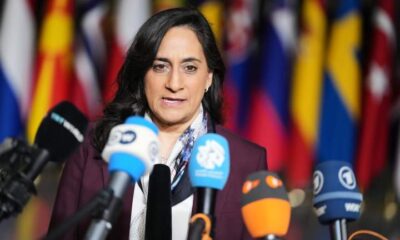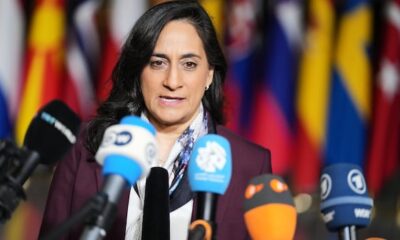Business
EU Faces Dilemma Ahead of Trump-Putin Summit in Alaska

The upcoming summit between US President Donald Trump and Russian President Vladimir Putin in Alaska on August 15, 2023, has left European leaders grappling with uncertainty. As the meeting approaches, European officials are working to prevent the United States from making decisions that could adversely affect Ukraine, while also preparing potential sanctions against Russia. The lack of new diplomatic initiatives has left Europe feeling sidelined in discussions that could shape the continent’s future.
In the wake of the summit announcement, European diplomats have intensified their efforts. Meetings took place over the weekend between JD Vance, the US Vice President, and European representatives in Britain. Additionally, the foreign ministers of the EU convened for a videoconference on August 11. On August 13, several leaders, including Ukrainian President Volodymyr Zelenskyy, are scheduled to connect with Trump in a bid to assert their interests in the forthcoming discussions.
European officials have expressed concerns over the mixed signals emanating from Washington. They describe the communication as “chaotic,” with various factions within the US administration appearing to have differing objectives for the summit. This uncertainty has only added to the anxiety felt by European leaders, who are eager to maintain a role in discussions concerning Ukraine’s future.
A key point of contention for Europe is the need for a cease-fire in Ukraine before any discussions about concessions can take place. European officials have reiterated their commitment to supporting Ukraine’s sovereignty and territorial integrity, making it clear that they will not recognize any Russian claims over Ukrainian territory, including Crimea, which has been under Russian control since 2014.
There is skepticism about Russia’s willingness to withdraw troops from occupied regions, as historical precedents suggest reluctance on Moscow’s part to disengage from territories like Transnistria in Moldova and the breakaway regions of Abkhazia and South Ossetia in Georgia. Despite these concerns, European leaders are determined to influence the outcome of any negotiations.
As the summit draws closer, EU leaders are preparing for a potential 19th round of sanctions against Russia. While some previous measures have been somewhat effective, they have not significantly altered the Kremlin’s military or political calculations over the past three years. The bloc also holds over 200 billion euros in frozen Russian assets, which could become a bargaining chip in future negotiations regarding reparations for the conflict.
France’s Emmanuel Macron and the UK’s Keir Starmer have suggested the establishment of a “reassurance force” of 20,000 European troops to be deployed in western Ukraine. However, uncertainties regarding the rules of engagement and the level of American support complicate this proposal.
While many see NATO membership as the ultimate security guarantee for Ukraine, there is currently no consensus among member states on this issue. Discussions at NATO summits in 2023 and 2024 have shown divisions among allies, further complicating the situation.
Amid these diplomatic efforts, Hungary has opted not to support a joint EU statement, illustrating cracks in European unity. Budapest, which maintains positive relations with the Kremlin, has expressed interest in an EU-Russia summit following the Trump-Putin meeting. This stance raises concerns about Hungary’s commitment to EU principles, particularly as it has already resisted stronger measures against Russia and potentially obstructs Ukraine’s aspirations for EU membership.
The political landscape in Europe remains fluid as the summit approaches. With the fate of Ukraine hanging in the balance, European leaders are keen to assert their influence, yet they are increasingly aware of their marginalization in discussions that could shape the region’s future. As the situation develops, the EU faces the challenging task of remaining relevant in a rapidly changing geopolitical environment.
-

 Politics4 weeks ago
Politics4 weeks agoSecwepemc First Nation Seeks Aboriginal Title Over Kamloops Area
-

 World5 months ago
World5 months agoScientists Unearth Ancient Antarctic Ice to Unlock Climate Secrets
-

 Entertainment5 months ago
Entertainment5 months agoTrump and McCormick to Announce $70 Billion Energy Investments
-

 Science5 months ago
Science5 months agoFour Astronauts Return to Earth After International Space Station Mission
-

 Lifestyle5 months ago
Lifestyle5 months agoTransLink Launches Food Truck Program to Boost Revenue in Vancouver
-

 Technology3 months ago
Technology3 months agoApple Notes Enhances Functionality with Markdown Support in macOS 26
-

 Lifestyle3 months ago
Lifestyle3 months agoManitoba’s Burger Champion Shines Again Amid Dining Innovations
-

 Top Stories2 months ago
Top Stories2 months agoUrgent Update: Fatal Crash on Highway 99 Claims Life of Pitt Meadows Man
-

 Politics4 months ago
Politics4 months agoUkrainian Tennis Star Elina Svitolina Faces Death Threats Online
-

 Sports5 months ago
Sports5 months agoSearch Underway for Missing Hunter Amid Hokkaido Bear Emergency
-

 Politics5 months ago
Politics5 months agoCarney Engages First Nations Leaders at Development Law Summit
-

 Technology5 months ago
Technology5 months agoFrosthaven Launches Early Access on July 31, 2025





















